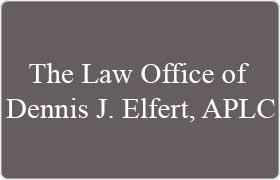Garden City Timeshare Lawyer, Louisiana
Sponsored Law Firm
-
 x
x

Click For More Info:
-
The Law Office of Dennis J. Elfert, APLC
522 Roussell St Houma, LA 70360» view mapReal Estate Law Over 25 Years Of Experience
Dennis Elfert is a practicing lawyer in the state of Louisiana who handles Social Security, Estate, Real Estate, and Accident and Injury matters.
985-655-3333
Not enough matches for Garden City Timeshare lawyer.
Below are all Garden City Real Estate lawyers.
Rose Susan Eugenia Dorsey
Estate, Divorce & Family Law, Land Use & Zoning, Traffic, Criminal
Status: In Good Standing Licensed: 44 Years
 Dennis Elfert Houma, LA
Dennis Elfert Houma, LA
